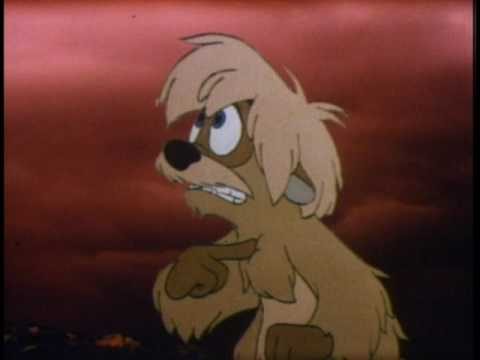This movie was part of the era when my family didn’t get to theatres much. My dad had died two years earlier, and we were poor. My younger sister turned five that year, and I can’t imagine Mom would’ve taken her to see this even if she’d squeeze room out of the budget for rereleases of things like Fantasia. This was, after all, a PG release, and I think two years had been long enough for Mom to become aware of some of our new sensitivities. So I’ve never seen this on the big screen and wonder sometimes if I’d have more fondness for it if I had.
The movie is something of a melding of The Book of Three and The Black Cauldron, by Lloyd Alexander. In the movie, Taran (Grant Bardsley) is an assistant pig-keeper charged with guarding Hen Wen, an oracular pig. She is in the care of Dallben (Freddie Jones), who learns that the Horned King (John Hurt) seeks her so that he might find the Black Cauldron, a mystic artifact that will permit him to raise a horrific army called the Cauldron-Born and thereby take over the world. So Dallben sends Taran off to protect her. Naturally, he gets to daydreaming about being a hero and thereby falls into the Horned King’s clutches.
Taran is aided in his escape by Princess Eilonwy (Susan Sheridan) and the bard Fflewddur Fflam (Nigel Hawthorne). As they make their way out of the Honred King’s dungeons, Taran finds an enchanted sword that he believes will make him a great warrior. Along with Gurgi (John Byner), they follow Hen Wen’s trail to the land of the Fair Folk. King Eiddeleg (Arthur Malet) tells them he knows where the Black Cauldron is, and Our Heroes seek to destroy it before the Horned King can use it to rule the world.
This is a super complicated story. Part of that is that it’s a mash of two books; part of that is that Lloyd Alexander was channeling Welsh folklore. I was flipping back and forth between my article and the IMDb page, and I observed, “Oh, that’s right, this character has a comically Welsh name.” My response to my boyfriend asking which one was a surly “All of them.” Long years ago, I actually took Irish in college, and our joke was that there’d been a war between the Irish and the Welsh, and the Irish won all the vowels. This isn’t entirely true; Welsh is exceedingly fond of the “ei” diphthong. But that doesn’t mean the names are easy to remember or spell.
Is that one of the reasons for this movie’s underperformance? Lord of the Rings suggests not. (While it isn’t Welsh, it’s certainly proof that Alexander didn’t have the monopoly on fantasy filled with complicated character names.) Considerably more likely is that it is a dark movie from a company people don’t, however incorrectly, expect darkness from. This was PG, and it had to get trimmed to avoid a PG-13—or R. While I can name three movies from Disney over the decades that involved spirits rising from the dead in an ominous fashion, the one where that’s a major part of the plot came out well after and is still seen as an action comedy.
The other . . . has better art. Oh, part of the problem here is that I did not see this in a desirable format, as my DVD copy is in storage, but even at its most pristine, no one’s going to mistake this for “Night on Bald Mountain.” Mind you, the art on the Cauldron-Born is considerably better than some of the other stuff; the Fair Folk are particularly poorly done. Most Disney animation of this era has a Don Bluth feel—well, for obvious reasons—and the Fair Folk are the worst offenders.
In contrast, my four-year-old insisted that the wyverns were “Mom’s stuffed dragon,” by which he means Maleficent. (I have a stuffed Maleficent I bought at Disneyland in 1995.) There are obvious differences, not least being the difference between a wyvern and a dragon in the first place (the number of legs), but they look enough alike to be the same if you are four and not paying terribly close attention. I don’t know for sure, but I expect the style on the wyverns, Cauldron-Born, and so forth owes a lot to a certain shaggy-haired fellow who at the time was working as an animator and would go on to direct a movie or two.
Basically, though, the movie’s greatest failing to me is tonal whiplash. When Gurgi goes to sacrifice himself for the good of the world because it’s not like he has any friends anyway, that’s a little hard to process from the fuzzy comic relief who’s always blathering about “munchings and crunchings.” It’s been a while since I read the books, so I don’t know how it plays out in them, but here, it does not feel as though Gurgi’s increased nobility is earned the way you accept Taran’s acknowledgement that he’s not a sword-wielding hero. And that’s even assuming you didn’t find Gurgi annoying in the first place, which I know a lot of people did.

